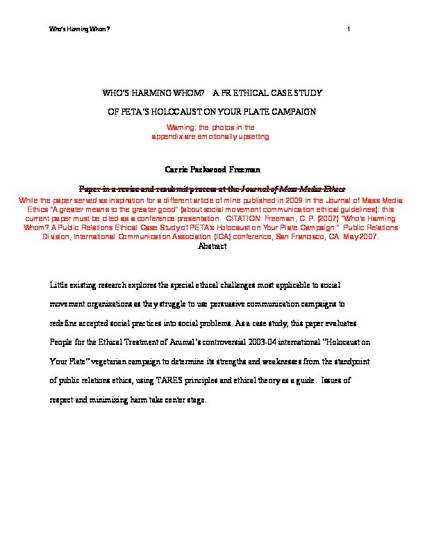
Unpublished Paper
Ethical analysis of PETAs Holocaust on Your Plate Campaign.pdf
Conference Paper
(2007)
Abstract
Little existing research explores the special ethical challenges most applicable to social movement organizations as they struggle to use persuasive communication campaigns to redefine accepted social practices into social problems. As a case study, this paper evaluates People for the Ethical Treatment of Animals' (PETA) controversial 2003-04 international "Holocaust on Your Plate" vegetarian campaign to determine its strengths and weaknesses from the standpoint of public relations ethics, using TARES principles and ethical theory as a guide. Issues of respect and minimizing harm take center stage. Both speciesist and nonspeciesist perspectives are considered.
Note: this can be cited as a conference paper, but not as a publication, but it did serve as the inspiration for a more general publication of mine in the Journal of Mass Media Ethics, called "A Greater Means to the Greater Good" (2009). Warning: The photos in the attached document are emotionally upsetting.
Keywords
- PETA,
- animal rights,
- vegetarian,
- farm animal,
- public relations,
- social movement,
- ethics
Disciplines
Publication Date
Spring 2007
Comments
This conference paper contains images that are emotionally upsetting (in the appendix).
Citation Information
CITE AS CONFERENCE PAPER: Freeman, C. P. (2007) “Who’s Harming Whom? A Public Relations Ethical Case Study of PETA’s Holocaust on Your Plate Campaign.” PR Division. International Communication Association annual conference, San Francisco. May 2007.
